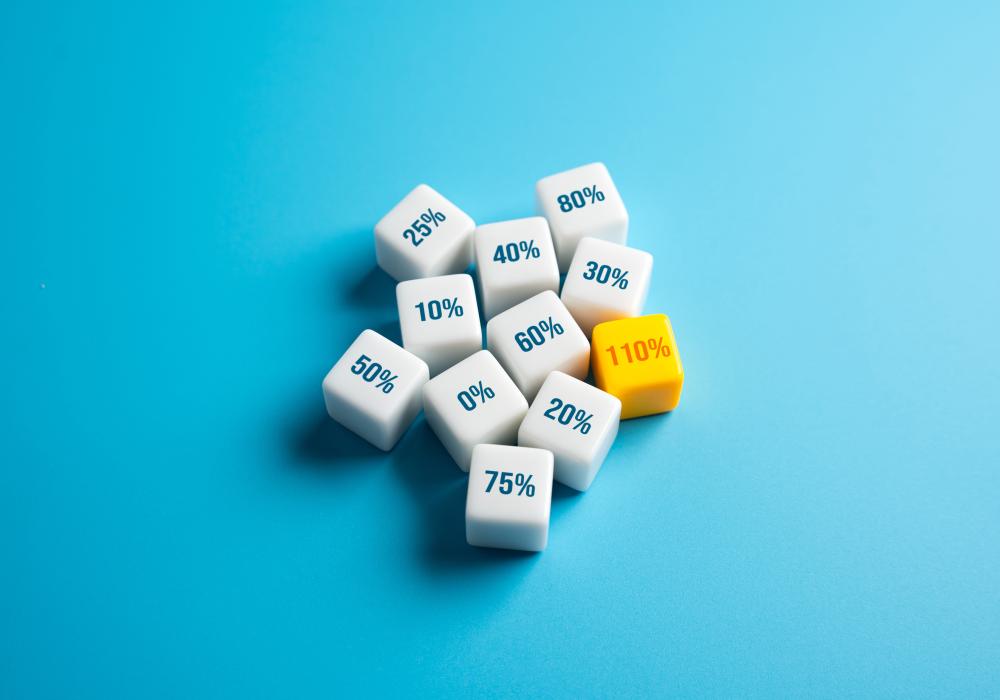What is Domain Rating Score?
Derived from Ahrefs, the domain rating score measures the strength of a website's backlink profile. This metric uses a scale from 0 to 100, providing a relative measure of how authoritative your site is based on the number and quality of referring domains. It's a valuable tool for SEO specialists looking to gauge their site's performance in comparison to competitors.
Why is Domain Rating Score Important?
As a seasoned SEO professional, I have observed the crucial role that the domain rating score plays in digital marketing strategies. A higher score often correlates with better ranking potential, meaning that your website is likely to perform better in search engine results. This is particularly important for businesses looking to boost organic traffic and outpace competitors in the digital realm.
While Google does not officially use domain rating as a ranking factor, there are indirect benefits. Websites with a strong backlink profile, as indicated by a higher domain rating score, tend to have more robust visibility and credibility, which contributes to increased traffic and user engagement.
- Build High-Quality Backlinks: Focus on obtaining links from reputable sites within your industry.
- Monitor Referring Domains: Regularly assess the quality of domains linking to your site and seek opportunities to gain links from diverse sources.
- Engage with Industry Influencers: Collaborate with influencers who can provide backlinks through guest posts or mentions.
These strategies not only bolster your domain rating score but also enhance your site's overall authority and online presence.
Common Concerns about Domain Rating Score
One concern businesses often express is whether focusing on domain rating score might lead them to neglect other crucial SEO factors. In my experience, balancing domain authority with on-page optimization and content quality is key. Also, some worry that a low domain rating implies failure. However, a low score can serve as a starting point for growth, guiding your link-building efforts.
- A low score is not an indicator of failure
- Focus on quality, not just quantity of backlinks
- Integrate domain rating strategies with other SEO tactics
What Qualifies as a Good Domain Rating Score?
A good domain rating score is subjective and should be assessed relative to your industry and competitors. Generally, a score above 50 indicates a solid backlink profile. Comparing your score to others in your niche can provide context and highlight areas for improvement.
In my two decades of navigating the ever-evolving landscape of SEO, I've found that a targeted approach to building relationships with high-authority sites can positively impact your score. Remember, it's not just about increasing numbers but leveraging them to improve visibility and engagement.
In navigating the vast world of SEO, domain rating moz plays a pivotal role. This metric, akin to a digital handshake, serves as an indicator of a website's authority within the search engine ecosystem. With over two decades in the field, I've observed how domain rating moz influences both novice bloggers and seasoned digital marketers. It provides a snapshot of your site's potential to rank, a valuable tool in the competitive quest for visibility.
Domain Rating Moz offers an insightful dashboard to gauge your online footing. Unlike Ahrefs' Domain Rating that predominantly measures referring domain strength, Moz focuses on diverse factors, including the quality of inbound links. This multifaceted approach is invaluable, particularly when devising strategies to outrank competitors. Observing variations between the two can offer a comprehensive view of your digital landscape.
Domain Rating Moz: Key Differences from Other Metrics
At first glance, domain rating moz might seem interchangeable with other metrics like Ahrefs' Domain Rating or Majestic's Trust Flow. However, it's essential to recognize the nuances. Domain rating moz evaluates the authoritative standing of a website through a combination of link factors, whereas Ahrefs focusses primarily on referring domains' quantity and quality.
This distinction underscores why a savvy SEO approach should incorporate multiple metrics. For example, while Moz might highlight a need for improving link diversity, Ahrefs could pinpoint the necessity for stronger referring domains. Both insights facilitate robust decision-making processes, affecting how resources are allocated for SEO endeavors.
How to Improve Your Domain Rating Moz
Boosting your domain rating moz involves strategic actions. Here's a concise plan I've employed over the years:
- Enhance Content Quality: Craft engaging, authoritative content that attracts backlinks organically. Aim for value-driven posts that industry peers find invaluable.
- Build Diverse Backlinks: Diversify your backlink profile by seeking connections with various authoritative domains instead of focusing on sheer volume.
- Audit and Clean Your Links: Regularly audit your site to identify and disavow toxic links that could detrimentally affect your domain authority.
- Engage in Strategic Partnerships: Collaborate with reputable organizations to engage audiences and foster high-trust link acquisitions.
What Qualifies as a Domain Rating Moz Emergency?
An emergency in the context of domain rating moz typically refers to a sudden drop in your site's rating. This may stem from unexpected factors like Google's algorithm updates, loss of crucial backlinks, or identification of a high spam score.
To address such issues, it is imperative to swiftly assess your backlink portfolio to ensure its integrity. Reacting promptly can mitigate potential damage, preserving your site's authoritative reputation. Regularly monitoring updates to Moz's algorithm can also provide foresight and adaptability in fluctuating search environments.
Common Misconceptions About Domain Rating Moz
Misinterpretations abound in the domain rating moz world. One frequent fallacy is the assumption that a high domain rating moz directly translates to top search engine rankings. In truth, while a higher rating typically indicates stronger potential, it doesn't guarantee superior SERP positions.
Another misconception is disregarding the significance of link quality. A site may boast numerous backlinks but still falter due to their poor quality. Focusing on acquiring links from high-authority sites is thus crucial. Lastly, some believe domain rating moz is static, when in reality, it demands consistent nurturing and strategic SEO practices to evolve.
- Backlink quality outweighs quantity.
- Continuous updates and monitoring are necessary.
- Adding value through content is a must for sustainable growth.
Why Domain Rating Matters
In the digital age, your website's domain rating seo is a pivotal metric in the SEO landscape. Developed by Ahrefs, it reflects the strength of your backlink profile, providing insights into your site's authority. As someone with over two decades in the SEO industry, I've witnessed firsthand how a strong domain rating can translate into higher search rankings and increased organic traffic.
The emphasis on domain rating seo aligns with the importance of quality backlinks. A high domain rating signifies that a site is considered trustworthy by other reputable domains, and this trust is a significant factor in search engine algorithms. Understanding domain rating seo is crucial for anyone looking to enhance their online presence.
What Is Domain Rating?
Domain Rating (DR) measures the authority of a website's backlink profile on a scale of 0 to 100. Unlike other metrics like Domain Authority, DR zeroes in on the quantity and quality of referring domains. The higher your DR, the more authoritative your site appears to search engines.
DR isn't just a number; it's a reflection of your site's ability to attract and maintain quality backlinks. Having worked in this field for years, I've seen how a delicate balance of quality and quantity in backlinks can skyrocket a site's authority.
Steps to Improve Your Domain Rating
If you're looking to improve your domain rating seo, there are actionable steps you can take:
- Focus on acquiring high-quality backlinks from reputable sites within your niche.
- Regularly audit your backlink profile to remove any toxic or harmful links.
- Engage in strategic link-building campaigns, ensuring a natural and organic growth of backlinks.
How Is Domain Rating Calculated?
The calculation of domain rating seo is rooted in the evaluation of both the quantity and quality of external links to a website. Ahrefs employs a proprietary algorithm that factors in:
- The number of unique domains linking to the target site.
- The authority of these linking domains.
- A logarithmic scale to provide a DR score on a 0 to 100 range.
This method allows for a relative comparison of sites, providing insights into where your site stands in the competitive landscape.
Is Domain Rating the Same as Domain Authority?
While both metrics assess a site's authority, domain rating seo and Domain Authority (DA) are distinct. Domain Rating focuses on backlinks, whereas DA includes various other factors. In practice, I've found that DR often provides a clearer picture of a site's backlink profile.
It's crucial to use DR in conjunction with other metrics to gain a holistic view of your site's SEO health. Relying solely on DR might not capture the full spectrum of factors impacting your search rankings.
How Can I Check My Domain Rating?
Checking your domain rating seo is straightforward with tools like Domain Rating IT. These tools offer insights into your current status and track historical changes. Using these resources can help identify trends and evaluate the effectiveness of your SEO strategies.
For those serious about improving their domain rating seo, it's imperative to regularly monitor and adapt strategies based on these metrics. Continuous learning and adaptation are the keys to maintaining a strong online presence.
What is Domain Rating and why does it matter for my website?
Domain Rating (DR), as defined by Ahrefs, measures the strength of your website's backlink profile on a scale from 0 to 100. It's like a report card for your site's authority, with a higher score indicating a stronger, more authoritative presence online. I often liken it to the foundation of a house; the stronger it is, the better your site's overall SEO potential. This metric is crucial because it gives you insight into how robust your backlinks are, which is a significant factor in how search engines perceive your site. A higher DR can enhance your site's likelihood of ranking well in search engine results, thus driving more organic traffic. For those keen to optimize their online visibility, understanding and improving DR is an essential step.
How can I improve my Domain Rating effectively?
Improving your Domain Rating requires a strategic approach to building high-quality backlinks. First, focus on creating valuable content that naturally attracts links from authoritative websites. I once collaborated on an in-depth case study with a well-known industry publication, which resulted in significant backlinks that boosted our DR. Engage with influencers in your niche to gain organic mentions and consider guest blogging for reputable sites to earn quality links. Another key aspect is regularly auditing your backlink profile to identify and disavow any toxic links. This ensures that your DR is not negatively impacted by low-quality or spammy backlinks. It's about quality over quantity, building a diverse and authoritative link profile that stands the test of time.
Is Domain Rating the same as Domain Authority, and which should I focus on?
While both Domain Rating (DR) by Ahrefs and Domain Authority (DA) by Moz assess website authority, they are distinct metrics. DR emphasizes the strength of your backlink profile, focusing on the quality and quantity of referring domains. On the other hand, DA accounts for multiple factors, including link quality and website trust signals. In my experience, DR provides a clearer understanding of your backlink health, while DA offers a broader SEO assessment. For a comprehensive strategy, it's beneficial to monitor both metrics, but if your primary goal is to strengthen your backlink profile, DR is particularly insightful.
Why does Domain Rating Moz matter for my digital strategy?
Domain Rating Moz is integral to understanding how well your site stands in search engine algorithms, beyond just backlink strength. It incorporates various quality signals, offering a multi-dimensional view of your site's authority. For instance, I once worked with a client who had a solid backlink profile but struggled to rank due to poor link diversity. By focusing on Moz's insights, we diversified their link profile, resulting in improved rankings. This metric is invaluable for identifying areas to enhance your site's overall trustworthiness and visibility, key components for outperforming competitors in SERPs.
How is Domain Rating calculated, and why is it important to understand this process?
Domain Rating is calculated using Ahrefs' proprietary algorithm, which evaluates the number and quality of unique domains linking to your site. It uses a logarithmic scale, meaning each increment is more significant than the last; moving from a DR of 30 to 40, for instance, is harder than from 20 to 30. Understanding this calculation helps you prioritize acquiring high-quality, diverse links rather than just increasing quantity. It's like knowing the rules of a game; understanding DR's intricacies allows you to strategize effectively, optimizing your link-building efforts for maximum impact.
What are some common misconceptions about Domain Rating that I should be aware of?
A common misconception is that a higher Domain Rating automatically guarantees top search engine rankings. While a strong DR is beneficial, it's not the sole determinant of SERP success. I once thought a client's high DR was sufficient, only to realize their on-page SEO needed improvement. Another myth is to focus solely on acquiring numerous backlinks; instead, prioritize quality and relevance. Finally, some believe DR is static, but it's dynamic and requires continuous effort to maintain and improve. Regularly engaging in strategic link-building and auditing practices is essential.
Can you share actionable tips for improving my Domain Rating today?
Absolutely! To boost your Domain Rating, start by identifying high-authority sites in your niche and plan to contribute valuable content or insights. This collaboration can open doors to natural link opportunities. Use Ahrefs to analyze your competitors' backlinks and identify potential link-building opportunities they may have missed. Additionally, consider forming partnerships with industry influencers to gain mentions and links. Remember, it's a marathon, not a sprint; consistent effort and quality content are key to gradually enhancing your DR. Feel free to explore how these strategies impact your long-term SEO success and share your experiences or questions!


